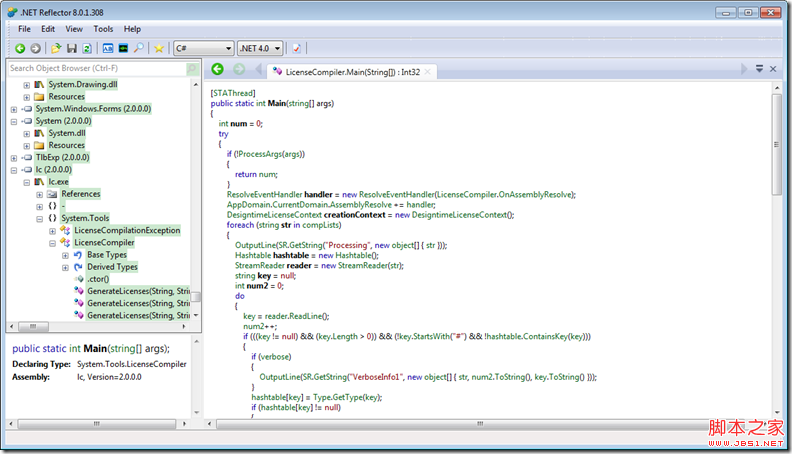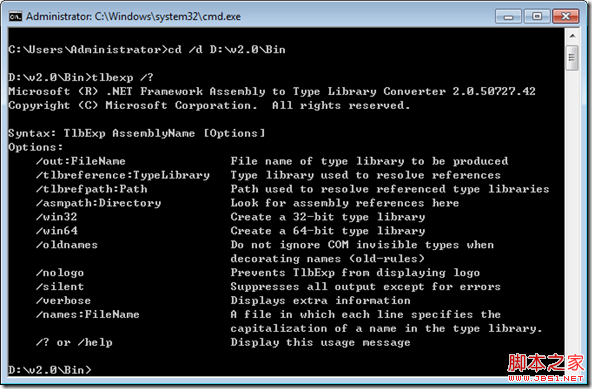在使用第三方類庫時,經常會看到它自帶的演示程序中,包含有這樣的Demo許可文件
復制代碼 代碼如下:
Infragistics.Win.Misc.UltraButton, Infragistics2.Win.Misc.v11.1, Version=11.1.20111.2009, Culture=neutral, PublicKeyToken=f8b58b62b52fdf31
Infragistics.Win.Misc.UltraLabel, Infragistics2.Win.Misc.v11.1, Version=11.1.20111.2009, Culture=neutral, PublicKeyToken=f8b58b62b52fdf31
Infragistics.Win.Printing.UltraPrintPreviewDialog, Infragistics2.Win.UltraWinPrintPreviewDialog.v11.1, Version=11.1.20111.2009, Culture=neutral, PublicKeyToken=f8b58b62b52fdf31
Infragistics.Win.UltraWinDataSource.UltraDataSource, Infragistics2.Win.UltraWinDataSource.v11.1, Version=11.1.20111.2009, Culture=neutral, PublicKeyToken=f8b58b62b52fdf31
這個文件的格式是文本文件,但要按照它的格式要求來寫:
控件名稱, 程序集全名稱
首先根據需要,寫一個需要被授權的控件列表,格式如上所示。例如,HostApp.exe 的應用程序要引用Samples.DLL 中的授權控件 MyCompany.Samples.LicControl1,則可以創建包含以下內容的 HostAppLic.txt。 MyCompany.Samples.LicControl1, Samples.DLL。
再調用下面的命令創建名為 HostApp.exe.licenses 的 .licenses 文件。 lc /target:HostApp.exe /complist:hostapplic.txt /i:Samples.DLL /outdir:c:\bindir
生成將 .licenses 文件作為資源嵌入在HostApp.exe的資源中。如果生成的是 C# 應用程序,則應使用下面的命令生成應用程序。
csc /res:HostApp.exe.licenses /out:HostApp.exe *.cs
.NET Framework SDK目錄中的LC.EXE文件是由.NET語言編寫的,它的功能就是為了根據許可文件的內容,生成資源文件。在編譯的最後時刻,由CSC編譯器把生成的資源文件嵌入到執行文件中。
用.NET Reflector載入LC.EXE,開始源代碼分析之旅。

程序的入口處先是分析命令行參數,根據參數的不同來執行指定的功能。先看一個完整的參數列表。代碼是下面三行
復制代碼 代碼如下:
if (!ProcessArgs(args))
{
return num;
}
 MSDN有完整的解釋,拷貝到下面方便您參考,以減少因查找MSDN引起思路中斷。
MSDN有完整的解釋,拷貝到下面方便您參考,以減少因查找MSDN引起思路中斷。
/complist:filename 指定包含授權組件列表的文件名,這些授權組件要包括到 .licenses 文件中。每個組件用它的全名引用,並且每行只有一個組件。命令行用戶可為項目中的每個窗體指定一個單獨的文件。Lc.exe 接受多個輸入文件並產生一個 .licenses 文件。
/h[elp] 顯示該工具的命令語法和選項。
/i:module 指定模塊,這些模塊包含文件 /complist 中列出的組件。若要指定多個模塊,請使用多個 /i 標志。
/nologo 取消顯示 Microsoft 啟動標題。
/outdir:path 指定用來放置輸出 .licenses 文件的目錄。
/target:targetPE 指定為其生成 .licenses 文件的可執行文件。
/v 指定詳細模式;顯示編譯進度信息。
/? 顯示該工具的命令語法和選項。
ProcessArgs方法的關鍵作用是分析出組件列表,程序集列表,如下面的代碼所示
復制代碼 代碼如下:
if ((!flag3 && (str2.Length > 7)) && str2.Substring(0, 7).ToUpper(CultureInfo.InvariantCulture).Equals("TARGET:"))
{
targetPE = str2.Substring(7);
flag3 = true;
}
if ((!flag3 && (str2.Length > 8)) && str2.Substring(0, 9).ToUpper(CultureInfo.InvariantCulture).Equals("COMPLIST:"))
{
string str3 = str2.Substring(9);
if ((str3 != null) && (str3.Length > 1))
{
if (compLists == null)
{
compLists = new ArrayList();
}
compLists.Add(str3);
flag3 = true;
}
}
if ((!flag3 && (str2.Length > 2)) && str2.Substring(0, 2).ToUpper(CultureInfo.InvariantCulture).Equals("I:"))
{
string str4 = str2.Substring(2);
if (str4.Length > 0)
{
if (assemblies == null)
{
assemblies = new ArrayList();
}
assemblies.Add(str4);
}
flag3 = true;
}
分析出組件和程序集之後,再來ResolveEventHandler 委托的含義。如果運行庫類加載程序無法解析對程序集、類型或資源的引用,則將引發相應的事件,從而使回調有機會通知運行庫引用的程序集、類型或資源位於哪個程序集中。ResolveEventHandler 負責返回解析類型、程序集或資源的程序集。
復制代碼 代碼如下:
ResolveEventHandler handler = new ResolveEventHandler(LicenseCompiler.OnAssemblyResolve);
AppDomain.CurrentDomain.AssemblyResolve += handler;
對第一部參數分析出來的組件列表,依次循環,為它們產生授權許可
復制代碼 代碼如下:
DesigntimeLicenseContext creationContext = new DesigntimeLicenseContext();
foreach (string str in compLists)
{
key = reader.ReadLine(); hashtable[key] = Type.GetType(key); LicenseManager.CreateWithContext((Type) hashtable[key], creationContext);
}
最後,生成許可文件並保存到磁盤中,等待CSC編譯器將它編譯成資源文件,嵌入到程序集中。
復制代碼 代碼如下:
string path = null;
if (outputDir != null)
{
path = outputDir + @"\" + targetPE.ToLower(CultureInfo.InvariantCulture) + ".licenses";
}
else
{
path = targetPE.ToLower(CultureInfo.InvariantCulture) + ".licenses";
}
Stream o = null;
try
{
o = File.Create(path);
DesigntimeLicenseContextSerializer.Serialize(o, targetPE.ToUpper(CultureInfo.InvariantCulture), creationContext);
}
finally
{
if (o != null)
{
o.Flush();
o.Close();
}
}
這種方式是.NET Framework推薦的保護組件的方式,與我們平時所討論的輸入序列號,RSA簽名不同。
來看一下,商業的組件是如何應用這種技術保護組件的。
復制代碼 代碼如下:
using System;
using System.Web;
using System.Web.UI;
using System.Web.UI.WebControls;
using System.ComponentModel;
namespace ComponentArt.Licensing.Providers
{
#region RedistributableLicenseProvider
public class RedistributableLicenseProvider : System.ComponentModel.LicenseProvider
{
const string strAppKey = "This edition of ComponentArt Web.UI is licensed for XYZ application only.";
public override System.ComponentModel.License GetLicense(LicenseContext context, Type type, object instance, bool allowExceptions)
{
if (context.UsageMode == LicenseUsageMode.Designtime)
{
// We are not going to worry about design time Issue a license
return new ComponentArt.Licensing.Providers.RedistributableLicense(this, "The App");
}
else
{
string strFoundAppKey;
// During runtime, we only want this control to run in the application
// that it was packaged with.
HttpContext ctx = HttpContext.Current;
strFoundAppKey = (string)ctx.Application["ComponentArtWebUI_AppKey"];
if(strAppKey == strFoundAppKey)
return new ComponentArt.Licensing.Providers.RedistributableLicense(this, "The App");
else
return null;
}
}
}
#endregion
#region RedistributableLicense Class
public class RedistributableLicense : System.ComponentModel.License
{
private ComponentArt.Licensing.Providers.RedistributableLicenseProvider owner;
private string key;
public RedistributableLicense(ComponentArt.Licensing.Providers.RedistributableLicenseProvider owner, string key)
{
this.owner = owner;
this.key = key;
}
public override string LicenseKey
{
get
{
return key;
}
}
public override void Dispose()
{
}
}
#endregion
}
首先要創建一個類型,繼承於License類型,再創建一個繼承於LicenseProvider的類型,用於頒發許可證,包含在設計時許可和運行時許可,從上面的例子中可以看到,設計時沒有限制,可以運行,但是到運行時,你必須有序列號,它才會生成許可對象,而不是返回null給.NET Framework類型。整個驗證過程由.NET完成。
你只需要像下面這樣,應用這個許可保護機制:
復制代碼 代碼如下:
[LicenseProvider(typeof(RedistributableLicenseProvider))]
public class MyControl : Control {
// Insert code here.
protected override void Dispose(bool disposing) {
/* All components must dispose of the licenses they grant.
* Insert code here to dispose of the license. */
}
}
控件許可的驗證代碼(RedistributableLicenseProvider)與控件本身的邏輯完全分離,分工協作保護組件的知識產權。

